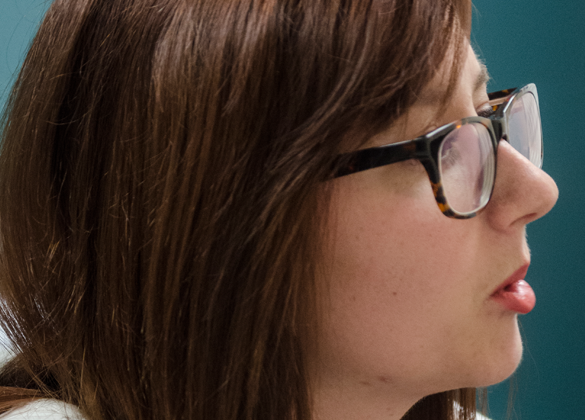
Before starting college at Ball State, Judy Zhu went to high school from 6 a.m. to 10 p.m. every day. No weekends. No breaks. If she had a boyfriend, her parents and teachers would tell her to break up with him. Life, as she describes it, was a lot of pressure—all leading up to being accepted to a university. Now, at 22, she laughs as she talks about how much going to college in America has changed her perspective on the future and her relationship with her parents.
As thousands of traditional students start school for the first time, there are also international students. Zhu came from China to Ball State three years ago to study business administration. After getting her undergraduate degree in May, she now studies fashion merchandising as a graduate student.
Zhu, as an only child, found it difficult to get her parents to let her study in the United States. After attending a study abroad tour of American colleges, she knew she had to study here.
“It [was] a culture shock, but I love it,” Zhu said. “Once I went back, I told my parents I must go to America.”
Last year, Zhu was one of 1,034 international students at Ball State, making it the first year that the school reached 1,000 students, which was part of the strategic plan.
[one_third_last][topswf swf=’http://ballbearingsmag.com/wp-content/uploads/2014/08/interactivemap.swf’ width=’850px’ height=’650px’ quality=’best’ wmode=’transparent’ scale=’default’ flashvars=” allowfullscreen=’false’][/one_third_last]
Brigit Anthrop, the International Student Advisor, said this is a major accomplishment for the school, and she hopes they can maintain those numbers. The 5-year plan was originally supposed to end in 2015, so the school hit the mark ahead of schedule.
“We’re proud of that one,” Anthrop said. “When President Gora started, there was closer to 300 or 400 international students. Within a 10-year period we have really increased our enrollment a lot.”
With so many international students coming to Ball State now, Anthrop said the culture shock often affects students making the transition. She said many students that come over in groups will stay close to friends from their home country.
“[It] can be somewhat of a hindrance if they stick only with those students, because then they’re not really adjusting to American life,” Anthrop said. “They have their small enclave of ‘we have this life and we happen to be going to school in the United States.’”

Laura Valandro, a Master’s student studying public administration said transitioning from life in France to life in the United States was easier for her because she already knew English.
“If you’re coming, don’t just stay with people from your own country,” Valandro said. “Don’t be afraid to talk to the professors because they’re here for that. Just enjoy it, don’t be scared.”
Just like Zhu, Valandro has noticed cultural differences from her home culture in France. She said many people don’t realize there are different processes for getting accepted to school in America.
One part of Valandro’s application process was taking a test to prove her knowledge of English. She also had to prove she was financially stable and wouldn’t need to use America’s money.
Universities work differently in other countries, too. For Valandro, college in France would have cost her $300 maximum per year. For that reason, not many students from her high school go on to study in America.
“It kind of is [a big deal],” Valandro said. “My friends are very impressed when I tell them how much I have to pay… You know, it’s expensive over here.”
Zhu, who had a much different experience in high school than in the U.S., says the high school and university expectations are different in China.
“In America, high school [seems] very relaxed and easy,” Zhu said. “In university, it is very tough and you spend a lot of time in the library to do research and to be ready for your career. In China it is different.”
In high school, Zhu said students prepare for three years for one college entry exam. College, on the other hand, is more relaxed in China.
At Ball State, Zhu is currently the president of the International Student Ambassador Association and she founded the Chinese Kung Fu Club. She says she thinks she is fully involved in American life, and even has an American boyfriend she can talk openly to her parents about.
Through her stay in the U.S., she says her parents have become indirectly influenced by American culture, and as a result they have become closer as a family.
“Now, we are like friends and we talk about everything,” Zhu said. “We make jokes to each other. I miss them now. Before, I didn’t miss them, but now I miss them.”
Zhu attributes part of this easy transition to the Rinker Center, where people like Anthrop work to provide resources and programs for international students.
Although sometimes students have a difficult time transitioning to American life, both Valandro and Zhu said they love the educational system in the U.S. and the experience they are getting at Ball State.
“It’s a very good experience to grow up and get to know the world around you,” Zhu said. “American life is tough at the beginning, but once you pass that moment, your life will be wonderful.”




